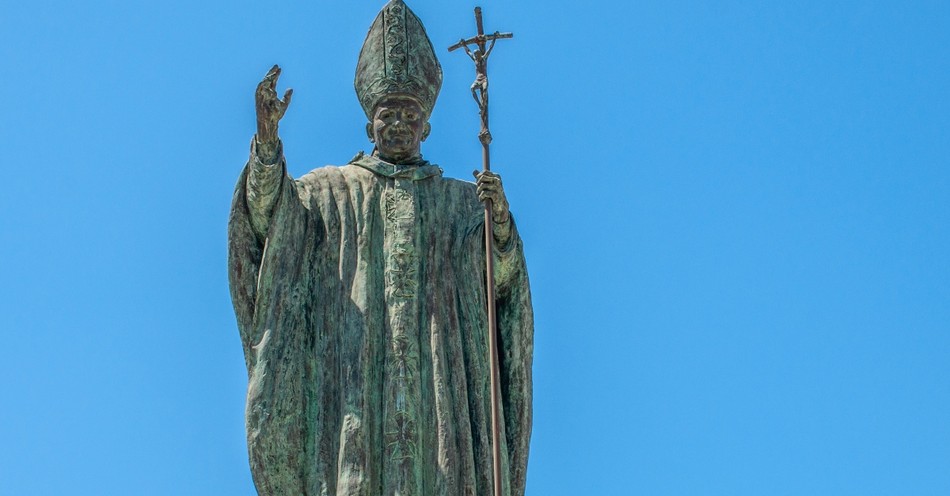When Christians today ask, “Who was the first pope?”—the first head of the worldwide Catholic Church–the answer is not as simple as it might seem. Much depends on whether one is looking for a biblical, historical, or traditional response.
Before we delve into the various beliefs about the first pope, we need to know what a pope is and what role he plays in the Church. Catholics have long believed in the need to elect one man–chosen by the worldwide College of Cardinals– “to have full and supreme power of jurisdiction over the universal church in matters of faith and morals, as well as in church discipline and government,” says Britannica.com. Also known as the “Holy Father” or “His Holiness” and “the papacy” by Catholics around the world, the pope is believed to have a biblical mandate to lead the church, following in the footsteps of the Apostle Peter– a key pillar of the early church. But should we consider Peter the first pope? This makes the question less about a single man first holding a title and more about how the church’s leadership evolved over time.
Does the Bible Say Anything about the Pope?
Nowhere in the Bible do we find the term pope,or a description of the office as it is known today. However, Catholics point to passages such as Matthew 16:18–19, where Jesus tells Peter, “You are Peter, and on this rock I will build my church,” as biblical support for Peter’s unique leadership role. In addition, Peter’s prominence in the New Testament—preaching at Pentecost, speaking on behalf of the apostles, and being named first in apostolic lists—has been seen as evidence that he was the first pope of the Christian Church. These texts, while not explicitly defining a pope, are often interpreted as providing the scriptural roots for the role of a pope.
At the same time, many Christians note that the Bible does not describe Peter or any apostle holding a centralized, ongoing office of supreme authority over the entire church. Leadership in the New Testament appears more shared, with elders and apostles guiding together. We could call out James, the brother of Jesus, and certainly the Apostle Paul as those who exerted incredible influence and authority when the church was young. Because of this, Protestants generally see the papacy as a later development of church history rather than a biblical institution.
Is the Apostle Peter the First Pope?
Roman Catholic teaching says that Peter was the first pope because Jesus gave him a unique role among the apostles. Again, according to Matthew 16:18–19, Jesus said to Peter:
“You are Peter, and on this rock I will build my church, and the gates of Hades will not overcome it. I will give you the keys of the kingdom of heaven; whatever you bind on earth will be bound in heaven, and whatever you loose on earth will be loosed in heaven.”
In addition to this passage, Catholics may point to what Jesus said to Peter between the resurrection and the ascension. Jesus commissioned Peter to “feed my sheep”(John 21:15-17) , which can be interpreted as “lead my sheep,” interpreting this as Jesus establishing Peter as the chief shepherd of His Church. The “keys” symbolize authority, and the “rock” is seen as Peter himself. Because Peter eventually ministered and, according to tradition, died in Rome, Catholics regard him as the first bishop of Rome.
However, not all Christians agree with this belief. Many Protestants argue that Peter’s role was important but not equivalent to the level of worldwide leader. They see his influence as one among other apostles and followers rather than an office with supreme authority.
Thus, whether Peter is the first pope depends largely on whether you accept the Catholic view of Matthew 16 as instituting the papacy, or whether you see it as affirming Peter’s faith and confession without creating a new role that would later be filled by others.
What Biblical and Historical Evidence Is There for Peter as the First Pope?
The New Testament portrays Peter as a leader among the apostles. He is the most frequently mentioned apostle, often speaks for the group, and plays a central role in the early chapters of Acts. At Pentecost, Peter preaches the sermon that brings thousands to faith (Acts 2). He performs miracles, defends the gospel before authorities, and is considered the first to intentionally preach to Gentiles in Acts 10.
Still, the Bible also shows other apostles exercising authority. James, the brother of Jesus, presides at the Jerusalem Council in Acts 15. Paul confronts Peter in Galatians 2 when Peter’s actions conflicted with the gospel. In 2 Timothy, a man named Linus is mentioned, and some later theorized that he was the first bishop of Rome. These passages suggest that while Peter was influential, his leadership was not absolute in the way later popes are understood to be.
The historical evidence for Peter as bishop of Rome is more difficult to pinpoint than Catholic tradition suggests. Early Christian writers such as Irenaeus, who wrote in the late 2nd century, affirm that Peter and Paul founded the Roman Church and were martyred there. The Roman historian Tacitus, who also lived in the early 2nd century, confirms that Christians were persecuted under Nero, but he does not mention Peter specifically.
By the mid-2nd century, the idea of leadership succession in Rome was well entrenched. The Roman bishop of that time, Anencletus, claimed to inherit authority from Peter and Paul, which gave the Roman church a unique standing compared to all of the other churches that the apostles established in other regions. But whether Peter first held the formal title of bishop of Rome remains debated. Many scholars argue that the office of “bishop” in Rome did not exist in Peter’s lifetime; instead, the church was led by a group of elders.
Although Peter’s presence and martyrdom in Rome are strongly supported by tradition, the evidence of his serving as the first pope in the later sense cannot be directly linked.
How Do Protestants Vs. Catholics Interpret Peter’s Role in Church Leadership?
For Catholics, Peter is the rock upon which Christ built His Church. His successors, the bishops of Rome, inherit the authority of the “keys to the kingdom.” This succession ensures unity, doctrinal continuity, and the ability to exercise binding authority in matters of faith and morals. The papacy, therefore, is not simply a historical accident but a divine institution rooted in Jesus’ words to Peter while He was on earth.
Catholics also point to early church writings. For example, Clement of Rome (around A.D. 96) wrote with authority to the church in Corinth, suggesting an early exercise of Roman superiority. Irenaeus of Lyons emphasized the Roman church’s “preeminent authority” because of its connection to Peter and Paul. These writings form part of the Catholic claim that Peter’s role continued through his successors.
Protestants generally honor Peter as a great apostle but deny that he was the first pope. They argue that Jesus is the true head of the Church (Colossians 1:18), and that authority rests in Scripture rather than in one position within the body of Christ. They often interpret Matthew 16 differently—either as referring to Peter’s confession of faith, not to his person, or as emphasizing that the “rock” is Christ Himself.
Protestants also stress that the apostles functioned as a group, not under one supreme leader. For Protestants, the early church’s appeal to Peter and Paul as founders of Rome is historical, not theological; it does not imply that the pope holds unique divine authority.
In short, Catholics see Peter as the first pope by divine appointment, while Protestants view him as an important but fallible human whose leadership does not establish an ongoing papacy.
Who Were the Early Bishops of Rome after Peter?
If Peter was indeed in Rome and martyred there, the question remains: who followed him? The early lists of Roman bishops differ somewhat, but they usually include the following names:
Linus (c. A.D. 67–76) – Mentioned by Irenaeus and also in 2 Timothy 4:21, Linus is traditionally considered Peter’s immediate successor.
Anacletus or Cletus (c. 76–88) – Sometimes two names, sometimes one, but generally seen as the next in line.
Clement I (c. 88–99) – Best known for his letter to the Corinthians, which shows that the Roman church already exercised a degree of authority across all Christian churches
Evaristus, Alexander I, Sixtus I, Telesphorus, Hyginus, Pius I, Anicetus, Soter, Eleutherus – These names represent the bishops of Rome in the second century.
By the time of the third century, the role of the bishop of Rome had become more defined, and his authority more widely recognized. But the early church did not yet have the fully developed doctrine of papal infallibility or universal authority. These doctrines evolved much later, particularly in the medieval period and at the First Vatican Council in 1870. Thus, the succession of bishops after Peter shows continuity in leadership at Rome, but the papacy as we know it today took centuries to develop.
Does it Matter Who the First Pope Was?
The question of who the first pope was might be educational for Christians, but for Catholics, affirming Peter as the first pope is essential because it indicates that the papacy was founded by Christ in his words to this apostle. Without this foundation, the Catholic understanding of the Church’s teaching and moral authority would be undermined. For Protestants, what matters most is faith in Christ, faithfulness to the truth of the Bible, and the priesthood of all believers.
Historically, it is clear that Peter played a central role in the early church, and tradition indicates he ministered in Rome. He may not have been a “pope” in the later sense, but his presence, and then martyrdom, gave the Roman church a unique status. Over time, that status developed into the papacy.
So, does it matter who the first pope was? Yes—but perhaps in different ways for different Christians. For Catholics, it matters as the foundation of papal authority. For Protestants, it matters more as a window into how church leadership developed historically. Ultimately, all Christians can agree that Peter was a faithful servant of Christ, whose witness continues to inspire believers across traditions.
Photo credit: ©Getty Images/ByEveLivesey
Mary Oelerich-Meyer is a Chicago-area freelance writer and copy editor who prayed for years for a way to write about and for the Lord. She spent 20 years writing for area healthcare organizations, interviewing doctors and clinical professionals and writing more than 1,500 articles in addition to marketing collateral materials. Important work, but not what she felt called to do. She is grateful for any opportunity to share the Lord in her writing and editing, believing that life is too short to write about anything else. Previously she served as Marketing Communications Director for a large healthcare system. She holds a B.A. in International Business and Marketing from Cornell College (the original Cornell!) When not researching or writing, she loves to spend time with her writer daughter, granddaughter, rescue doggie and husband (not always in that order).




